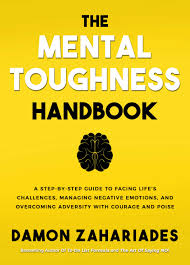This whitepaper explores the intersection of two powerful frameworks for overcoming adversity: the practical approach of mental toughness outlined in The Mental Toughness Handbook by Damon Zahariades and the philosophical wisdom of Stoicism, as popularized by Ryan Holiday in The Obstacle Is the Way. By combining these two perspectives, we can develop a comprehensive strategy for building resilience, managing emotions, and thriving in the face of challenges.
The Obstacle Is the Way: A Synthesis of Mental Toughness and Stoic Philosophy
This whitepaper explores the intersection of two powerful frameworks for overcoming adversity: the practical approach of mental toughness outlined in The Mental Toughness Handbook by Damon Zahariades and the philosophical wisdom of Stoicism, as popularized by Ryan Holiday in The Obstacle Is the Way. By combining these two perspectives, we can develop a comprehensive strategy for building resilience, managing emotions, and thriving in the face of challenges.
Understanding Mental Toughness
Mental toughness, as defined by Zahariades, is the ability to maintain a positive mindset and perform under pressure. It involves:
- Resilience: The capacity to bounce back from setbacks and adversity.
- Self-belief: A strong sense of self-efficacy and confidence in one's abilities.
- Control: The ability to manage thoughts, emotions, and behaviors.
- Commitment: A persistent dedication to goals and values.
The Stoic Perspective on Obstacles
Stoic philosophy, a school of thought originating in ancient Greece and Rome, teaches that we cannot control external events, but we can control our response to them. Key Stoic principles relevant to mental toughness include:
- Acceptance: Embracing the inevitable and accepting things as they are.
- Perspective: Maintaining a long-term perspective and recognizing that most problems are temporary.
- Action: Focusing on what is within our control and taking action to improve our circumstances.
- Inner Peace: Cultivating a calm and serene mind, regardless of external circumstances.
Combining Mental Toughness and Stoic Philosophy
By merging the practical strategies of mental toughness with the philosophical wisdom of Stoicism, we can create a powerful approach to overcoming adversity. Here are some key strategies:
- Embrace Challenges:
- Stoic Perspective: View obstacles as opportunities for growth and character development.
- Mental Toughness: Develop a mindset of resilience and persistence.
- Practice Mindfulness:
- Stoic Perspective: Focus on the present moment and avoid dwelling on the past or future.
- Mental Toughness: Use mindfulness techniques to manage stress and anxiety.
- Cultivate Self-Discipline:
- Stoic Perspective: Prioritize actions that align with your values and goals.
- Mental Toughness: Develop strong self-control and willpower.
- Develop a Growth Mindset:
- Stoic Perspective: Embrace a lifelong learning journey and seek continuous improvement.
- Mental Toughness: Believe in your ability to learn and grow from challenges.
- Practice Gratitude:
- Stoic Perspective: Focus on the positive aspects of life and appreciate what you have.
- Mental Toughness: Cultivate a positive outlook and a sense of optimism.
Conclusion
By combining the practical tools of mental toughness with the philosophical wisdom of Stoicism, we can develop a robust approach to overcoming adversity. By embracing challenges, practicing mindfulness, cultivating self-discipline, adopting a growth mindset, and practicing gratitude, we can build resilience, manage emotions, and thrive in the face of any obstacle.
References:
- Zahariades, D. (2020). The Mental Toughness Handbook: A Step-by-Step Guide to Facing Life's Challenges, Managing Negative Emotions, and Overcoming Adversity with Courage and Poise.
- Holiday, R. (2014). The Obstacle Is the Way: The Timeless Art of Turning Trials into Triumph.
